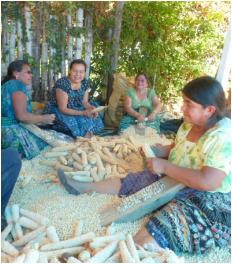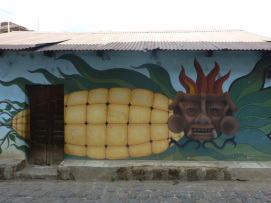La Gente del Maiz, The People of the Corn

La Gente del Maiz documents an extended family of indigenous Tzutijil Maya as they work to process the year's corn harvest. I was profoundly moved by their labor, by their relationship with the corn and by their warm welcome of me and my camera.
Corn, which is now grown around the world, was first domesticated by the Maya 7000 years ago from a wild grass with spikes, teosinte. The first ears of corn were less than an inch long. Now the Mayas carry burlap sacks higher than they are tall, full with long, heavy ears of corn from the campo. They save their best seeds for the next year --unless they are forced by hunger to eat them before the year ends.
At the end of each harvest day, every kernel of corn is swept or picked from the ground; nothing of the corn is wasted. The stalks and most of the husks will be fed to the horses, the corn cobs are fuel for the cooking fires, the best husks will be wrappers for steamed chuchitos, Guatemalan tamales. Most of the precious kernals of corn will be ground and hand-patted into tortillas.
VIDEO: LA GENTE DEL MAIZ THE PEOPLE OF THE CORN
Corn, which is now grown around the world, was first domesticated by the Maya 7000 years ago from a wild grass with spikes, teosinte. The first ears of corn were less than an inch long. Now the Mayas carry burlap sacks higher than they are tall, full with long, heavy ears of corn from the campo. They save their best seeds for the next year --unless they are forced by hunger to eat them before the year ends.
At the end of each harvest day, every kernel of corn is swept or picked from the ground; nothing of the corn is wasted. The stalks and most of the husks will be fed to the horses, the corn cobs are fuel for the cooking fires, the best husks will be wrappers for steamed chuchitos, Guatemalan tamales. Most of the precious kernals of corn will be ground and hand-patted into tortillas.
VIDEO: LA GENTE DEL MAIZ THE PEOPLE OF THE CORN
Who Owns the Corn?

The Maya's unbroken tradition of corn is increasingly threatened. Agriculture requires land, which continues to be taken from the Maya people through corporate agriculture, biofuel production and mining. In Guatemala, 50% of the children suffer malnutrition which continues to be a leading cause of death. The growing use of land for biofuel instead of corn production means that fewer Guatemalans can grow their own food as the land is being used for exported biofuel == few Guatemalans can afford to have a car themselves.
The agro-chemical giant Monsanto is now the greatest threat to the world's supply of hierloom corn. Current research shows Monsanto's patented "Foundation" corn suffers increasing crop failure, fosters superpests and superweeds and has been shown to cause cancer in rats. Globally, Monsanto works to prohibit farmers from saving their own seeds and sues increasing numbers of farmers for infringement t of Monsanto's property rights when that farmer's adjacent property has been contaminated with pollen from Monsanto's GMO corn, contamination the farmer didn't ask for! In addition Monsanto is pushing for permission to plant in countries like Mexico and Guatemala, which have the world's most diverse hierloom corn seed. This strategy guarantees a contamination of existing corn seed with a Monsanto's corn. Because Monsanto's products threaten the integrity of the global food supply itself, increasing numbers of countries have banned Monsanto's GMO crops, while the US continues to plant increasing amounts of Monsanto's products, despite Monsanto's leading role in the global destruction of tried and tested agricultural products and practices. For more information on Monsanto and campaigns to challenge their practices, please see http://www.organicconsumersunion.org
Food is one of our most intimate and vital relationships. And perhaps agriculture has been humanity's most generous and skilled art. Please help keep the art of traditional agriculture alive. Thank you.
The agro-chemical giant Monsanto is now the greatest threat to the world's supply of hierloom corn. Current research shows Monsanto's patented "Foundation" corn suffers increasing crop failure, fosters superpests and superweeds and has been shown to cause cancer in rats. Globally, Monsanto works to prohibit farmers from saving their own seeds and sues increasing numbers of farmers for infringement t of Monsanto's property rights when that farmer's adjacent property has been contaminated with pollen from Monsanto's GMO corn, contamination the farmer didn't ask for! In addition Monsanto is pushing for permission to plant in countries like Mexico and Guatemala, which have the world's most diverse hierloom corn seed. This strategy guarantees a contamination of existing corn seed with a Monsanto's corn. Because Monsanto's products threaten the integrity of the global food supply itself, increasing numbers of countries have banned Monsanto's GMO crops, while the US continues to plant increasing amounts of Monsanto's products, despite Monsanto's leading role in the global destruction of tried and tested agricultural products and practices. For more information on Monsanto and campaigns to challenge their practices, please see http://www.organicconsumersunion.org
Food is one of our most intimate and vital relationships. And perhaps agriculture has been humanity's most generous and skilled art. Please help keep the art of traditional agriculture alive. Thank you.
